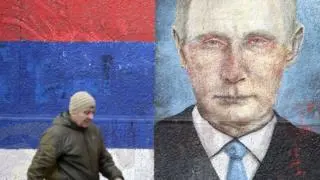简体中文
繁體中文
English
Pусский
日本語
ภาษาไทย
Tiếng Việt
Bahasa Indonesia
Español
हिन्दी
Filippiiniläinen
Français
Deutsch
Português
Türkçe
한국어
العربية
Putin warns West on Balkans as Serbia prepares lavish welcome
Abstract:Image copyrightEPAImage caption President Putin will be joined by several government ministers and

Russian President Vladimir Putin heads a powerful delegation to Serbia on Thursday, aiming to cement co-operation with a country seeking to join the EU.
Ahead of his Belgrade visit, Mr Putin accused some Western countries of "destabilising" the Balkans.
Security will be tight in the Serbian capital. MiG jets will escort his plane and 7,000 police are being deployed.
Residents are being urged not to go on their balconies to watch Mr Putin being driven through Belgrade.
The measures follow big opposition protests against President Aleksandar Vucic and his ruling SNS party over recent weeks, with demonstrators accusing him of clamping down on media freedom and attacking the opposition.
Despite the high security, tens of thousands of people are reportedly planning to greet the Russian leader's visit to the Church of St Sava, the biggest Orthodox church in Serbia.
Although Serbia is a candidate to join the European Union it remains a close ally of Moscow.
- Putin attends Austrian minister's wedding
By Guy Delauney, BBC Balkans correspondent
It is a question that just will not go away: if Serbia is so determined to join the European Union, then why does it keep making such a show of its friendship with Russia?
Playing up ties with Moscow appeals to the conservative-nationalist core support of President Vucic and his Progressive Party. It emphasises the Slavic, Orthodox Christian character of the country even as Serbia's direction of travel is westward.
- Nato and Serbia put bombing behind them
- The Serbian town where neighbours won't share a coffee
- Rumours and spies in the Balkans as Russia seeks influence
It also helps Mr Vucic to argue that policies which bring Serbia closer to EU membership - such as normalising relations with Kosovo - are not imposed by Brussels, but rational choices to improve the lives of the country's people.
Image copyrightGetty ImagesImage caption The Serbian leader (R) is expected to receive a rare Russian honour from Mr Putin for increasing co-operationDiplomatically, playing host to Russia's president is a reminder to the EU not to take Serbia's loyalty for granted - and to stick to its accession target of 2025.
Meanwhile, Vladimir Putin will doubtless enjoy the discomfort of Western diplomats observing the prime candidate for EU membership rolling out the red carpet.
What has Putin said?Mr Putin accused the "US and some other Western countries" of trying to secure dominance in the Balkans, by absorbing Montenegro into Nato and seeking to bring Macedonia into the Western military alliance too.
The Russian president gave two interviews ahead of his visit, highlighting centuries of ties, and reports say 21 deals are set to be signed, including on energy and defence.
President Vucic is keen on getting Russian gas, which he wants to acquire through Russia's TurkStream pipeline under the Black Sea to Bulgaria.
He also promised to continue developing military and technical co-operation with Serbia and criticised the EU's handling of Kosovo.
Disclaimer:
The views in this article only represent the author's personal views, and do not constitute investment advice on this platform. This platform does not guarantee the accuracy, completeness and timeliness of the information in the article, and will not be liable for any loss caused by the use of or reliance on the information in the article.
WikiFX Broker
Latest News
Why Even the Highly Educated Fall Victim to Investment Scams?
Warning Against Globalmarketsbull & Cryptclubmarket
Axi Bids AUD 52M to Acquire Low-Cost Broker SelfWealth, Outbidding Competitor Bell Financial
Crypto Influencer's Body Found Months After Kidnapping
Currency Calculator


